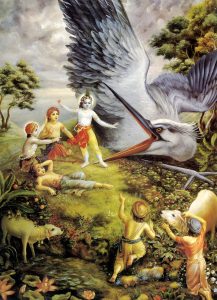 tato duḥsaṅgam utsṛjya
tato duḥsaṅgam utsṛjya
satsu sajjeta buddhimān
santa evāsya chindanti
mano-vyāsaṅgam uktibhiḥ
Śrīmad-Bhāgavatam 11.26.26
Therefore an intelligent person should reject all bad association and instead take up the association of saintly devotees, whose words cut off one’s attachment to material existence.
The idea is that anyone who makes a pretence of engaging in devotion while remaining motivated by other desires not only deceives himself but others as well. Anyone who is a cheater or who tolerates such cheating behaviour is by definition duḥsaṅga or bad association. Contact with such persons will render even long-term dedication to the practice of bhakti futile.
―Śrīla Bhakti Pramoda Purī Mahārāja (The Heart of a Vaishnava, The Four Kinds of People Who Turn to the Lord, Chapter 1, page 22)
A person naturally develops possessiveness and attachment to that in which he invests his energy, faculties and  resources. If a person engages his body, mind, words and resources for Śrī Hari— who is saccidānanda, or composed of eternity, consciousness and bliss—then he is bound to gradually develop attachment for Śrī Hari. It is only when he renounces all other desires and engages in such service that he will become immersed in the Lord and attain His association. If he employs his body, mind and words for the sake of the Supreme Lord, the source of topmost bliss, he is certain to attain good fortune. True association with true sādhus is absolutely essential for those seeking auspiciousness. A man’s inclinations arise from the company he keeps. That is why bad association is always to be rejected. In the absence of sādhus, one must study the scriptures, sincerely give up other hankerings and cry out to Śrī Kṛṣṇa. Then, one’s heart will be cleansed and, by His mercy, the path to attain Him will become easily accessible.
resources. If a person engages his body, mind, words and resources for Śrī Hari— who is saccidānanda, or composed of eternity, consciousness and bliss—then he is bound to gradually develop attachment for Śrī Hari. It is only when he renounces all other desires and engages in such service that he will become immersed in the Lord and attain His association. If he employs his body, mind and words for the sake of the Supreme Lord, the source of topmost bliss, he is certain to attain good fortune. True association with true sādhus is absolutely essential for those seeking auspiciousness. A man’s inclinations arise from the company he keeps. That is why bad association is always to be rejected. In the absence of sādhus, one must study the scriptures, sincerely give up other hankerings and cry out to Śrī Kṛṣṇa. Then, one’s heart will be cleansed and, by His mercy, the path to attain Him will become easily accessible.
―Śrīla Bhakti Dayita Mādhava Mahārāja (Affection and Reproach: The Synthesis of Love, page 62)
The living entity’s hypocrisy is his primary enemy. You must give up hypocrisy entirely. Though a sādhaka may be gripped by vice, if he is sincere and honest, he will quickly gain deliverance from the hands of misfortune by  the mercy of the devotees and the Lord.
the mercy of the devotees and the Lord.
You were eager to perform bhajana of Śrī Hari at a young age. Later, you fell down due to bad association and offenses at the feet of the devotees. If, once you feel remorse and grasp the fleeting nature of sense objects, you can again humbly pray for the mercy of the devotees and the Lord, you will certainly obtain the mercy of Śrī Gaurahari. There is no cause to be hopeless. If anyone causes you pain, never become vengeful or consider harming them. If possible, you should humbly try to help or serve them. If you are truly incapable of this, then keep your distance from the company of such aggressive individuals. Do not criticize anyone. If you learn to identify your faults and endeavour to rectify them, by mercy of the compassionate Śrī Gaurahari, you will become capable of dispelling your vices. We alone are the cause of any harm we experience; others are simply instruments in manifesting it.
―Śrīla Bhakti Dayita Mādhava Mahārāja (Affection and Reproach: The Synthesis of Love, page 79)
Mahāprabhu only pretended to reject Choṭa Haridāsa, who was His eternal associate. Choṭa Haridāsa was a liberated soul. There was actually no offense on his part, but Mahāprabhu wanted to teach everyone by the example of this pastime. Mahāprabhu wanted to show that He cannot tolerate hypocritical behaviour.
―Śrīla Bhaktivedānta Nārāyaṇa Mahārāja (Lecture in Italy, June 15, 2001)
For some days, Kṛṣṇa went to the nearby forests with Baladeva and others to take the calves out to graze. One day, a very strong demon came in the shape of a calf. A bad fragrance came from him, because he took opium, flesh, meat, eggs, wine, and other bad things. A bad smell was coming from his nose and mouth. It was very severe. He came among all the calves, wanting to mix with them. All the calves held their tails high, turning them around and jumping about, as they moved in fear toward Kṛṣṇa and Baladeva.
Kṛṣṇa looked toward Baladeva and thought, “What is happening today? I see that all the calves are fearful. I also see a beautiful, strong new calf.”
Baladeva spoke with His eyes, not words: “There is something wrong. We should be careful.”
That demon calf [Vatsāsura] wanted to gradually come closer and kill Kṛṣṇa and Baladeva, but Kṛṣṇa immediately caught hold of the demon’s hind legs, swirled him around in the air, and threw him into the sky. The demon fell onto a tree. Kṛṣṇa ran, following him as he tried to escape. The forest where this happened is called Khadīravana. Do you know Khadīravana? We have gone there on Śrī Vraja-maṇḍala parikramā. Kṛṣṇa followed  the demon calf into Khadīravana and killed him.
the demon calf into Khadīravana and killed him.
After some days, a large demon named Bakāsura came. Baka means ‘crane.’ His lower beak was on the earth and his upper beak touched the sky. He wanted to swallow Kṛṣṇa.
At first, the crane appeared to be in a trance, like a yogī standing on one leg near a pond or near the Yamunā. Wanting to swallow Kṛṣṇa, he quickly picked Him up in his beak, but Kṛṣṇa became like a hot iron rod. Being unable to keep Kṛṣṇa in his throat, he vomited, and Kṛṣṇa was thrown free. The crane again wanted to attack Kṛṣṇa, but Kṛṣṇa quickly placed one leg on the demon’s lower beak, and with His hand, He raised the demon’s upper beak. In this way, Bakāsura was divided in two and thus killed.
These two demons, Vatsāsura and Bakāsura, were the embodiments of duplicity and hypocrisy. Nowadays, there are so many Bakāsuras, duplicitous people. At the time of Kṛṣṇa there was only one, but nowadays we cannot count them.
Though some people may have taken initiation and are chanting the holy name, wearing tulasī beads around their neck, applying tilaka, and displaying all other external signs of being a Vaiṣṇava, they remain very tricky – hypocritical and duplicitous. Outwardly, they seem friendly, but inwardly, they are like an enemy. Externally, they speak very sweet words, but inside, they hold a knife. Kṛṣṇa can recognize this and destroy them. We see that they fall down very quickly. If anyone is chanting the holy name, hearing hari-kathā, and remaining in good association, he should keep far away from such duplicity.
Duplicitousness is when one is chanting, remembering, and [appearing to be] a Vaiṣṇava, but is still overly attached to wealth, reputation, followers, wife, children, and so forth. Those who are deceitful and always criticizing and offending Vaiṣṇavas for petty reasons are offenders; they are not actually Vaiṣṇavas.
But to be [falsely] detached is also not good. We should make Kṛṣṇa the center of our life and relationships: “My wife is the beloved of Kṛṣṇa,” or “My husband is the beloved of Kṛṣṇa,” or “My children are the servants of Kṛṣṇa.” We should support and nourish this conception. [We should consider that] everyone is the servant of Kṛṣṇa, and thus associate with all the Vaiṣṇavas. Whatever we do, we should do for Kṛṣṇa.
The gopīs were married, as were many associates of Śrī Caitanya Mahāprabhu. The Pāṇḍavas were also householders, and they were not too attached. We should do all these things for Kṛṣṇa, because we are not qualified to be in the renounced order. But we can become qualified, gradually. When we come to the age of fifty or sixty, all these things should gradually be given up. Then, we can leave everything to our sons and our sons’ wives. At that time, we will be known as vānaprasthī (one who is retiring from material life). As a vānaprasthī, you can live with your wife, no harm. But after some  time, you should give your wife to your sons and be renounced in a proper way, doing bhajana like Śrīla Bhaktivinoda Ṭhākura.
time, you should give your wife to your sons and be renounced in a proper way, doing bhajana like Śrīla Bhaktivinoda Ṭhākura.
Family life is not bad. In it, we can learn many things. This world is the perverted reflection of the spiritual world [where Kṛṣṇa is the center of one’s activities]. It is like a ladder by which we can gradually go up. But when family life is not like a ladder, not like a school for training in spiritual life, then it is very bad. It should be like a training school where one learns how to love Kṛṣṇa. A married person should think, “I should love Kṛṣṇa like my son or like my husband – more than my husband – like a beloved, like a friend.” This household life is like a training school. Those who have past impressions of married life, having fully tasted it in previous lives, do not take to household life.
Those who pretend to be brahmacārīs but are not actually brahmacārīs will fall down after some time. They may have taken sannyāsa, the renounced order, and are preaching all over the world, but if they are internally attached to ladies and wealth, they were never qualified for this renounced order. They only pretended to be qualified for wealth and reputation. Guru should not give sannyāsa to such persons.
Those who are duplicitous in this way are like Bakāsura. We should try to be careful of this Bakāsura. You cannot kill him yourself. Who can kill him? Only Kṛṣṇa or Baladeva.
―Śrīla Bhaktivedānta Nārāyaṇa Mahārāja (Kṛṣṇa – the Lord of Sweetness, page 149)
One day, one of Śrī Śrīmad Bhaktivedānta Nārāyaṇa Gosvāmī Mahārāja’s earlier disciples posed a question to Śrīla Mahārāja:
“We repeatedly hear that even if a brahmacārī or sannyāsī disciple of our gurudeva had committed a grave transgression, Śrīla Gurudeva would never ask that person to leave the maṭha, despite any consequential outcry. Now, during his unmanifest pastimes, there are many devious individuals who resort to indolence, seek privileges or try to enjoy Śrīla Gurudeva’s assets and facilities. Such persons simply waste their time. If a senior devotee or maṭha in-charge notices them commit a major transgression and reproaches them in a disciplinary tone—As a resident of the maṭha, you should not act like this. Such behaviour is unacceptable, and if it persists, we can no longer accommodate you in this maṭha—the offender protests and immediately refers to Śrīla Gurudeva’s above-mentioned stance. With the objective of gratifying their enjoying propensity, they retort, ‘The conduct of the present generation of maṭha authorities differs vastly from that of Śrīla Gurudeva. We will surely oppose any authorities who defy us like this.’
“Are we truly at fault for taking a stance of admonishment? We have heard that like our Śrīla Gurudeva, Śrīla Bhakti Vallabha Tīrtha Gosvāmī Mahārāja would never chastise even the most reprobate individuals. Please tell us, how should we conduct ourselves?”
Śrīla Mahārāja replied, “Śrī Bhaktivedānta Nārāyaṇa Mahārāja and Śrī Bhakti Vallabha Tīrtha Mahārāja are both bona fide Vaiṣṇavas. I do not wish to comment on their conduct, as I am unaware of their implicit motive. Having said that, I can certainly assert that the practice of a guru admonishing his disciple has prevailed since ancient times. If any bona fide personality, impelled by some idiosyncrasy, differs in behaviour from the established path,  then such an act cannot be considered conventional and should not be emulated. For instance, upon being pleased with someone, Śrī Mīnaketana Rāmadāsa would climb atop his shoulders, whereas Śrī Abhirāma Ṭhākura would lash him with his whip. Śrīla Gaura-kiśora dāsa Bābājī Mahārāja used to chant harināma while sitting in a public lavatory. The behaviour of such venerable Vaiṣṇavas is not imitable.”
then such an act cannot be considered conventional and should not be emulated. For instance, upon being pleased with someone, Śrī Mīnaketana Rāmadāsa would climb atop his shoulders, whereas Śrī Abhirāma Ṭhākura would lash him with his whip. Śrīla Gaura-kiśora dāsa Bābājī Mahārāja used to chant harināma while sitting in a public lavatory. The behaviour of such venerable Vaiṣṇavas is not imitable.”
He continued, “Guru Mahārāja would always assert, ‘A place where people reside together becomes chaotic in the absence of the imposition of a framework of rules.’ Various disruptions are bound to manifest without the enforcement guide. It is therefore auspicious for everyone to remain subservient to any ordinances that pertain to them, and it is imperative to penalize those who transgress the law of the land. There is not a single gentleman anywhere who supports corruption or unscrupulous behaviour.’
“It is quite evident from Guru Mahārāja’s many letters that a person who is unable or unwilling to conduct his life according to the rules of the maṭha must not be granted residence there. And regarding the authorities of the maṭha, it should be known that meting out chastisement befits others only when the admonisher knows how to be affectionate.”
After giving this response, Śrīla Mahārāja retired to his room, where he continued speaking to his servants: “The era of extreme independence has arrived. Not only are people disinclined to follow the words of others, they are reluctant to heed the commands of their own guru. Although this was not the case during Guru Mahārāja’s time, insubordination still persisted, and so he was occasionally forced to adopt a firm stance and even dole out chastisement. In my opinion, it would be an invaluable service to preserve what few of his written letters remain and make them available for the faithful to closely study. I cannot do anything to change the current state of the world, nor can I monitor the extent to which devotees are capable of following or what deeds they actually perform. But I can at least present to them the ideals of our guru-varga. So, it would be quite fine if anyone were to effectuate this.” (Q&A with Śrīla Bhakti Vijñāna Bhāratī Mahārāja, Affection and Reproach: The Synthesis of Love, Introduction page 7)
Image/Art made possible by Pixabay.com & Krishnapath.org








